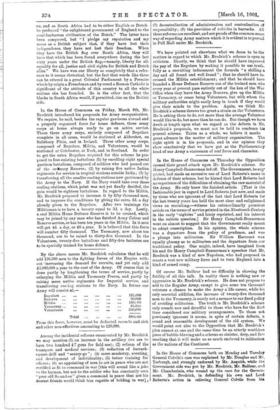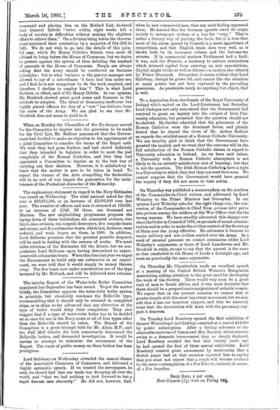In the House of Commons both on Monday and Tuesday
General Colvile's case was explained by Mr. Douglas and Mr, Yerburgh, and strongly endorsed by Mr. Asquith, while the Government side was put by Mr. Brodrick, Mr. Balfour, and Mr. Chamberlain, who wound up the case for the Govern- ment. Mr. Brodrick, in defending his own and Lord Roberts's action in relieving General Colvile from his command and placing him on the Retired List, declared that General Colvile "twice within eight weeks left a body of cavalry in difficulties without making the slightest effort to relieve them." On a division being taken the Govern- ment sustained their contention by a majority of 114 (262 to 148). We do not wish to go into the details of this pain- ful case, which Sir Henry Colvile's friends were most ill advised to bring before the House of Commons, but we desire to protest against the system of thus debating the conduct of generals in the House of Commons. People are always asking that the Army should be conducted on business principles ; but in what business is the general manager not allowed to say of a subordinate I have had him under me, and I find he is not competent to do the work required, and therefore I decline to employ him' P This is what Lord Roberta, in effect, said of Sir Henry Colvile. In our opinion, Mr. Brodrick showed great good sense and firmness in the attitude he adopted. The dread of dismissing inefficient but highly placed officers for fear of a " row " has hitherto been the curse of the Army. We are glad to see that Mr. Brodrick does not mean to yield to it.







































 Previous page
Previous page